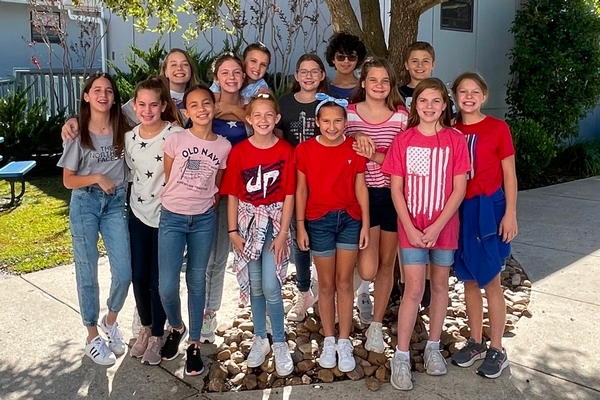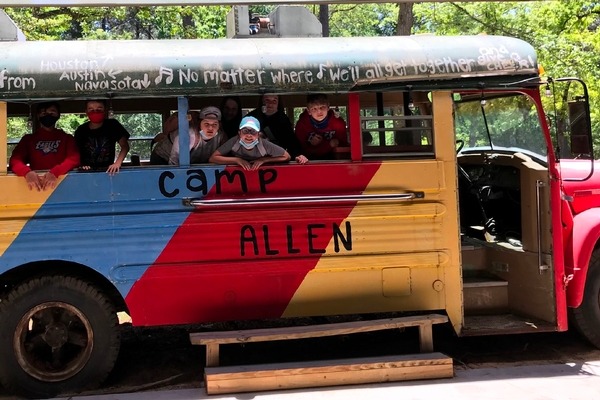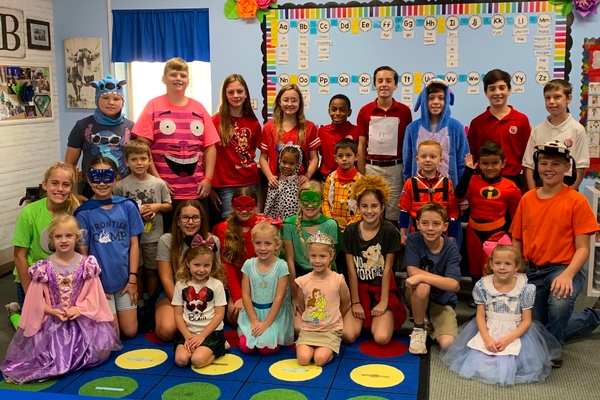Sixth Grade Course of Study
Grammar
The focus of sixth grade grammar is on application. Areas covered include the eight parts of speech, sentence types, sentence structure, capitalization, punctuation, and sentence classification.
Spelling
Students build familiarity with commonly misspelled words as well as word roots including prefixes and suffixes. The students’ decoding skills will also be strengthened. The tasks in this series are meaning-based, so students cannot complete the tasks successfully without knowledge of the words’ definitions or parts of speech.
Writing
The students focus on the writing process and writing for a variety of purposes. Types of writing covered include: expository writing, persuasive writing, narrative writing, descriptive, and creative.
Reading
Literature read in the sixth grade includes The Candymakers, The Jungle Book, The Voyage of the Dawn Treader, The Bronze Bow, and Peak.
Mathematics
In sixth grade math, students will build a strong foundation in a wide range of mathematical concepts while engaging in daily problem-solving and spiral review to reinforce and deepen their understanding. The curriculum incorporates problem solving, manipulatives, group activities, and math games to support greater conceptual understanding and make learning engaging and interactive.
Students will begin the year by learning to multiply and divide decimals and convert between fractions and decimals. They will practice ordering numbers on a number line, including fractions, mixed numbers, and integers. An introduction to integers will include absolute value, and students will learn to compare and order integers using a number line.
Operations with integers—including addition, subtraction, multiplication, and division—are explored in depth. Students will also work with coordinate grids and classify numbers into different categories. They will study ratios, proportions, rates, and unit rates, including ratio tables and how to apply proportions to percent problems. This includes converting fractions to percentages, working with benchmark percentages, and solving problems involving the part, whole, or percent.
Students will explore powers, exponents, prime and composite numbers, and prime factorization, as well as master the order of operations. They will learn and apply mathematical properties such as the distributive property, and use algebraic terminology to write and evaluate expressions. Combining like terms, solving equations with a given variable value, writing equations, and solving one-step equations using all four operations are key components of algebraic thinking at this level. Students will also write, graph, and solve inequalities.
Additional topics include identifying additive and multiplicative relationships, understanding independent and dependent variables, and using multiple representations to model mathematical relationships. In geometry, students will explore angle relationships, classify triangles, and calculate the area of rectangles, parallelograms, triangles, and trapezoids. The curriculum also includes data and statistics, as well as financial literacy to help students apply math in real-world situations.
Throughout the year, problem solving, manipulatives, group activities, and math games are integrated into instruction to foster collaboration, critical thinking, and a deeper grasp of mathematical concepts.
Science
In sixth grade science, students will explore God’s creation using the FOSS curriculum through a variety of engaging, hands-on activities that deepen their understanding of the natural world. During the first quarter, the focus will be on measurement and the scientific method. Through experiments and interactive lessons, students will gain a solid foundation in scientific inquiry and how to approach questions like a scientist.
In the second quarter, students will shift their focus to health and nutrition. They will learn why it’s important to take care of the bodies God created, exploring topics such as healthy eating habits, fats, and sugars. This unit includes exciting, hands-on experiences like fat and sugar content tests, as well as a creative “Restaurant Menu” project that allows students to apply what they’ve learned in a real-world context.
Beginning in the third quarter, students will apply their knowledge of the scientific method by selecting and completing individual science fair projects. This experience allows them to independently explore a topic of interest while practicing critical thinking, planning, and presentation skills.
In the fourth quarter, students will dive into Earth science using the FOSS Earth History textbook. They will study various features of God’s creation on Earth, including landforms, sedimentary, igneous, and metamorphic rocks, as well as the dynamic processes of the Ring of Fire. Throughout the year, science is brought to life through interactive learning that fosters curiosity, responsibility, and a deeper appreciation for the world God has made.
History
Students use the History Alive! The Ancient World curriculum to study Early Civilization, Mesopotamian Empires, Ancient Egypt, the origins of Judaism, Ancient India, and Ancient China. Additionally, daily geography activities provide students with a more in-depth understanding of the world.
Bible
In sixth grade Bible class, students use the Winning the Race curriculum from Positive Action for Christ to explore multiple character studies from both the Old and New Testaments, with a special focus on the life of Christ. Through these studies, they learn valuable lessons about faith, obedience, and godly character. Scripture memorization is a key part of the curriculum, and students are challenged to hide God’s Word in their hearts by memorizing and reciting weekly verses, including longer passages such as Romans 8:28–39 and Romans 12:1–21. These verses help shape their understanding of God’s truth and encourage spiritual growth. In addition, students occasionally participate in "Bible Leadership" sessions, which cover practical and relevant topics designed to help them navigate life as a 12-year-old with wisdom and a biblical perspective.
Field Trips
Sixth grade takes a big field trip to Camp Allen.
Computer
During once a week 30-minute sessions, students will sharpen keyboarding skills through Typing Club. All students learn Digital Citizenship and perform online research. Students will gain knowledge in word processing projects as they create documents, presentations and graphs in Google Docs, Slides and Sheets. Our students are also introduced to coding and robotics using Dash, Sphero Bolt and Indi Robots. All students will learn Digital Citizenship throughout the year and practice applying Christian principles and a Biblical worldview in the digital world.
Art
The goal of Visual Arts in the sixth grade art curriculum is to develop the knowledge of God’s character in creation through the visual arts. Furthermore, a goal to instill a love for art history through the study of the individual lives and works of master artists is explored. The purpose is to expand the students’ knowledge of God’s elements of design, which include Line, Shape, Color, Value, Form, Texture, and Space. Also students will perfect their techniques of production and be stretched in their knowledge of the principles of design, including Balance, Contrast, Emphasis, Movement, Pattern, Rhythm, and Unity. Throughout the year each student will have opportunities to create a variety of both two-dimensional and three-dimensional art pieces.
Sixth Grade Choir
Students put the musical knowledge and skills they have learned into practice resulting in music literacy development, personal musicianship and foundational ensemble skills. Students will sing a wide variety of repertoire chosen for its educational value, spiritual, artistic, and cultural significance. This Choir will put on four concerts a year using all these skills. Students will also compete in the solo and ensemble competitions.
Sixth Grade Band
Students put musical knowledge and skills into practice by playing instruments in a traditional concert band setting. Music is selected from a wide variety of cultural, historical, and spiritual settings with educational benefits in mind. Beginning band students may select one of the following instruments to play: flute, clarinet, alto saxophone, trumpet, trombone, or euphonium.
Library
Students will be introduced to many different authors and illustrators through a variety of literary genres. Students will develop research skills using reference material and computers. Activities include Author visits, guest readers, reading competitions and a variety of school wide reading events. Students attend library once a week for 30 minutes.
P.E.
Students will explore motor skills and movement patterns using an integrated curriculum. They will learn responsible personal and social behavior in a variety of physical activity settings. They will be provided frequent and diverse opportunities to engage in physical activities necessary to support a healthy mind and body. Students attend P.E. four times a week for 30 minutes each class. At least one day per week will be dedicated to our "Eagle Running Program," a self-paced activity specifically focused on improving cardiovascular fitness.
Chapel
Grammar School students enjoy Chapel once a week in two sessions: PreK through second grades and third through sixth grades. In order to study and apply meaning, the yearly school-wide Scripture is divided into sections for each month. In Chapel, Grammar School worships in song, Scripture, and prayer, followed by a special speaker who teaches the specific passage in a developmentally appropriate way. Our speakers include local pastors, children’s ministers, youth leaders, Christian camp directors, parents, and BCS teachers, staff, and administrators. All would agree that Chapel is the favorite time of the week!
Recess
Students have the opportunity to learn socialization skills through play and free activities outdoors. Lunch recess occurs after students are dismissed after eating and generally is 10-15 minutes per day. In addition, students enjoy a 20-30 minute recess daily.





